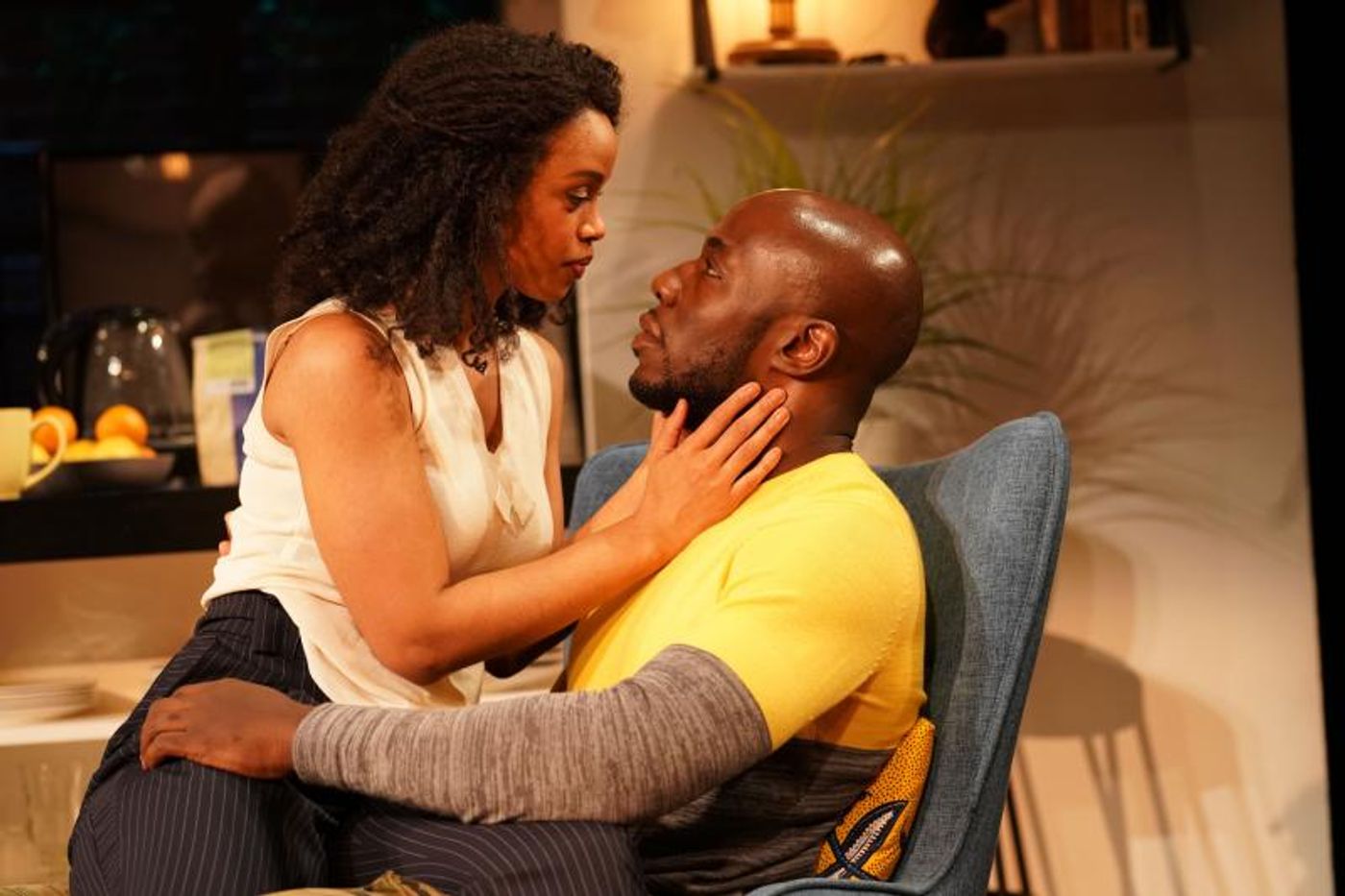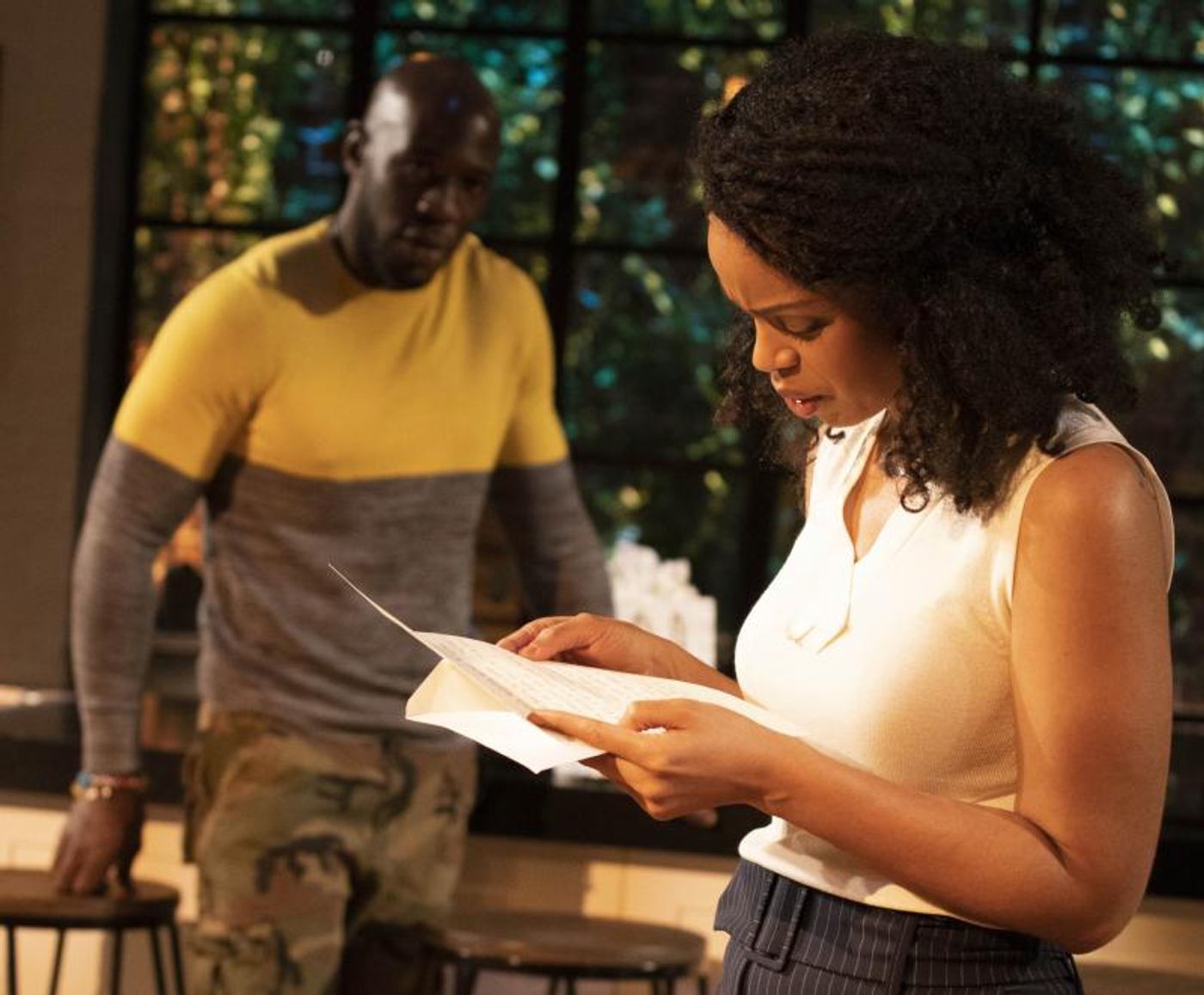Review: Loy A. Webb's Tense and Topical THE LIGHT Discusses The Privilege of Being Believed
"You keep talking about these false allegations," a woman survivor firmly explains. "Let me make this clear. For rape, which is what we're talking about, that percentage is super small."
"And in that percentage, however small, are innocent men," answers her firefighter boyfriend, whose dreams of an NFL career were quashed with one accusation.

(Photo: Joan Marcus)
The complicated matter of to whom society grants the privilege of being believed fuels the tense and topical fury of Loy A. Webb's thoroughly engrossing two-person drama, The Light, being given a breathtaking production at Manhattan Class Company's new West Side home by director Logan Vaughn. The tightly constructed 70-minute one-act takes a national issue and pinpoints its variables through the lives of an African-American couple, both of whom carry residual damage from different types of victimization.
The audience is seated on three sides of designer Kimie Nishikawa's chic Chicago condo, the home of Genesis (Mandi Masden), who decorates her home with many artistic depictions of strong African women.
But before she arrives home from work, her boyfriend Rashad (McKinley Belcher III), a single dad who cherishes his young daughter, gets in and starts tidying up the place, leading to some playful banter about the motives behind his contributing to the housework. On the surface, this is a beautiful couple living a pretty beautiful life.
But Genesis, the principal of a charter school for black children, is stressed out from her day at work. It's the day before the United States Senate would confirm Brett Kavanaugh as Associate Justice of the United States Supreme Court and it seems one of her teachers, who is a white woman, posted a photo on social media captioned "I Stand With Brett."
"She went on and on about how this whole thing was a liberal witch hunt designed to destroy Kavanaugh and the conservatives. And she said something like Dr. Ford is a puppet willingly falling on her own sword for their political agenda."
Genesis' colleagues want the teacher fired, but there's nothing she can do that wouldn't violate her First Amendment rights. Rashad sympathizes, calling the discrediting of Dr. Ford's testimony "a dangerous alternative view" that justifies the belief that she would reject the word of a student who might come to her with a story of abuse.
But the discussion is put on hold for happier matters. It's the second anniversary of their first date and Rashad intends to surprise Genesis with a marriage proposal and tickets to a concert that night.
It's an all-star event called Heal The Chi, intended to help unify the town after a period of violence. A woman who is Genesis' very favorite singer is on the bill, but she won't go because of the male star who's hosting the event. The fictional performer is someone Rashad admires for both his music and his community activism, but Genesis objects to the way his lyrics portray women.
"Anytime he mentions women it's something negative. Warning men to stay away from us, because we want to use them, trap them, ruin them, or can't take care of our kids."
"And Beyonce, Mary J. Blige, and Keyshia Cole don't make songs about how no good men are?"
"It's not the same."
"Why? Cause they in yo rotation?"
"No, because it's the truth."
Rashad worked hard to save the money for the tickets and had to pull some strings to acquire VIP access, so instead of truly listening to Genesis he keeps trying to convince her to let it go for one night. Finally she feels compelled to reveal details of the personal experience behind her decision.

(Photo: Joan Marcus)
Rashad's reaction leads to further discussion about accusations, believability and especially about the accusations that are not made. The talk becomes more heated as it becomes more personal. Both have moments when their claims to victimization are plainly justified, but both also have moments of insensitivity to the experiences of those who aren't of their gender. His dismissal of her attitude towards sexist lyrics is matched by her dismissal of his lost opportunity for an NFL career. The extra layer underneath is how each issue is applied differently to white people as it is to them, and not only by white people.
The heartbreaking realism of Masden and Belcher's excellent performances is intensified by their dynamic chemistry together. There's never any doubt that Genesis and Rashad are completely in love with and devoted to each other, but they also need to establish more empathy for each other, and for those not of their gender. This is especially evident when the topic turns to the matter of how men are supposed to learn about the experiences women have that shape their points of view. Seeing Genesis' weariness about men depending on women to teach them, and Rashad's frustration regarding not knowing a better way to understand what they want, is an aching romantic tragedy.
The title refers to the relief Genesis seeks from the darkness of her memories and the attitudes that keep women from speaking up.
"I am tired. Tired of fighting to be valued. Tired of fighting to be seen. Tired of fighting to be supported. Begging people to stand with me."
When this critic attended, both actors seemed completely emotionally spent at curtain call, clinging to each other for support. Undoubtedly there will be plenty of audience members finding themselves just as emotionally drained, experiencing this exceptional, intimate work that addresses a public conversation we're still just beginning to have.
Reader Reviews
Powered by
|
Videos

